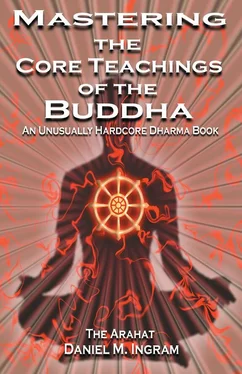Daniel Ingram - Mastering the Core Teachings of Buddha - An Unusually Hardcore Dharma Book
Здесь есть возможность читать онлайн «Daniel Ingram - Mastering the Core Teachings of Buddha - An Unusually Hardcore Dharma Book» весь текст электронной книги совершенно бесплатно (целиком полную версию без сокращений). В некоторых случаях можно слушать аудио, скачать через торрент в формате fb2 и присутствует краткое содержание. Год выпуска: 2009, ISBN: 2009, Издательство: Aeon Books, Жанр: Старинная литература, на русском языке. Описание произведения, (предисловие) а так же отзывы посетителей доступны на портале библиотеки ЛибКат.
- Название:Mastering the Core Teachings of Buddha - An Unusually Hardcore Dharma Book
- Автор:
- Издательство:Aeon Books
- Жанр:
- Год:2009
- ISBN:9781904658405
- Рейтинг книги:5 / 5. Голосов: 1
-
Избранное:Добавить в избранное
- Отзывы:
-
Ваша оценка:
- 100
- 1
- 2
- 3
- 4
- 5
Mastering the Core Teachings of Buddha - An Unusually Hardcore Dharma Book: краткое содержание, описание и аннотация
Предлагаем к чтению аннотацию, описание, краткое содержание или предисловие (зависит от того, что написал сам автор книги «Mastering the Core Teachings of Buddha - An Unusually Hardcore Dharma Book»). Если вы не нашли необходимую информацию о книге — напишите в комментариях, мы постараемся отыскать её.
Mastering the Core Teachings of Buddha - An Unusually Hardcore Dharma Book — читать онлайн бесплатно полную книгу (весь текст) целиком
Ниже представлен текст книги, разбитый по страницам. Система сохранения места последней прочитанной страницы, позволяет с удобством читать онлайн бесплатно книгу «Mastering the Core Teachings of Buddha - An Unusually Hardcore Dharma Book», без необходимости каждый раз заново искать на чём Вы остановились. Поставьте закладку, и сможете в любой момент перейти на страницу, на которой закончили чтение.
Интервал:
Закладка:
Training in morality also cultivates some of the Seven Factors of Enlightenment, though in a less formally meditative way. In order to work well in the ordinary world, it is very helpful to be mindful of what we are doing, saying and thinking and also what effects these produce in the world so that we can consciously work to craft the life we want to lead as best we can. It is helpful to exert energy as we craft our life for obvious reasons. We can also cultivate tranquility, the ability to not take life too seriously, to relax, finding that balance of focus and ease that makes for a good life. We can learn to concentrate on staying on track with our tasks, goals and aspirations, though in this case concentration is 50
The Seven Factors of Enlightenment
more like a form of discipline than the concentration of formal meditation, though discipline of action, speech and mind is vital for the other two trainings. Finally, we can learn that we cannot get rid of all of the bumps on our road, so having the shock absorbers of equanimity, the ability to stay spacious and accepting of what happens, is also very helpful for crafting a good and healthy life.
51
7.THE THREE TRAININGS REVISITED
The Three Trainings provide a great framework for thinking about spiritual work, a framework that can help us maintain a clear and empowering way of thinking about what we are doing. In this chapter, I will discuss many important aspects of the spiritual path and use the Three Trainings, actually the scope of each of the Three Trainings, to provide an easy and powerful way of dealing with these complex topics.
Just to review, the scope of the first training, which I call morality, is the ordinary world, the conventional world, the world that we are all familiar with before we even consider more specialized topics such as meditation. The goal is to act, speak and think in ways that are conducive to the welfare of yourself and others. The scope of the second training, concentration or depths of meditation, is to focus on very specific and limited objects of meditation and thus attain to specific altered states of consciousness. The scope of the third training, that of insight or wisdom, is to shift to perceiving reality at the level of individual sensations, perceive the Three Characteristics of them, and thus attain to profound insights into the nature of reality and thus realize stages of enlightenment.
First, I will consider happiness in the context of scopes of the Three Trainings. As training in morality is such a vast subject, the ways we can find happiness is also a vast subject, and becomes interesting primarily in comparison to the other two training’s scopes, those of concentration and wisdom. The common denominator of the concentration
attainments is that we learn to get ourselves into states of consciousness that are some mixture of blissful and peaceful, as well as increasingly spacious and removed from our ordinary experience. These can be a source of happiness that is far more intense and reliable than the happiness found in the ordinary world. Being able to access as much happiness and peace as we wish when we wish reduces our anger at the world from not providing us with these, making us less needy and greedy. There is also the happiness that comes from seeing the true nature of the sensations that make up our world and thus attaining to stages of realization or enlightenment.
There are three areas of renunciation that correspond to the scopes of the Three Trainings. We can renounce aspects of the ordinary world
The Three Trainings Revisited
by simply abandoning these things. We can quit our job, leave our relationship, stop smoking crack, and shave our heads. We can try to be less angry or fearful. We can work on our communication skills, trying to avoid lying and slander. Some of these may be easier than others, and some of these may be helpful and some not, but the important point here is that these sorts of forms of renunciation are, for better or for worse, renunciation of aspects of the ordinary world within the context of the first training’s scope. Or, we can renounce renouncing these things and do them. Renunciation is a very arbitrary concept when applied to the first training.
There is also the renunciation that comes from being willing and able to attain the temporary concentration attainments. We are willing to spend some time removed from the ordinary experience of the world and enter into states where the ordinary world becomes more and more removed from us. It is usually not that hard to convince people that there may be occasions when having the ability to renounce the ordinary world in this way for some period of time could be advantageous. We can all imagine taking a little bliss break and finding it helpful in some appropriate context.
There is also the type of renunciation associated with insight practices, in which one is willing to break from the gross conceptual way of working that is helpful for the scope of the ordinary world, break from the more restricted and refined conceptual way of working that is necessary to attain stable altered states of consciousness, and move to perceiving sensations individually and directly, seeing the true nature of them. This is a much more subtle and sophisticated form of
renunciation than the other two, and it is not always easy to convince people that having this option open to them is a good idea.
While “enlightenment” generally sounds very appealing, it suddenly sounds strange in the context of seeing all sensations as being utterly transient, a source of pain if we make artificial dualities out of them, and not self. People often mix up the three kinds of renunciation, the most common error being that they imagine that they must “give up” aspects of the first two trainings (a happy life and fun concentration states) in order to renounce them in the insight way, in which they see the true nature of the sensations that make up these things. They imagine that 53
The Three Trainings Revisited
they must give up their job or relationship in order to see its true nature, or imagine that they must not enter into high states to see their true nature. This basic conceptual error causes many of the problems that people find on the spiritual path. That brings me to the three forms of suffering.
First, there is the form of suffering that the Buddha is most famous for talking about, ordinary suffering, the standard list including such things as birth, sickness, old age, death, lamentation, pain, grief and despair. These are ordinary forms of suffering that we can try to mitigate as best we can by ordinary methods, i.e. by working within the scope of the first training, i.e. the conventional world. I am a big fan of trying to find worldly happiness so long as we do not neglect the importance of the other two trainings. There is also the form of suffering relating to the scope of the second training that comes from being limited to our ordinary state of consciousness, with our only way out coming from sleep or the use of chemical substances. We yearn for bliss that is not so bound up in things like whether or not we get a good job, for experiences like those found in the concentration states. Our minds have this potential, and the failure to be able to access these states at times when doing so would be helpful and healthy is a source of bondage. I am a big fan of being able to attain these wonderful states so long as we do not neglect the other two trainings.
There is also the kind of suffering that comes from making artificial dualities out of non-dual sensations, and all of the unnecessary reactivity, misperceptions, distortions of perspective and proportion, and basic blindfulness that accompanies that process. This kind of suffering, relating to the scope of training in wisdom, is not touched by the first two trainings, and thus forms a background level of suffering in our life and also increases the potential for further suffering in the other two scopes. This form of suffering is gradually relieved by the stages of enlightenment, as fewer and fewer aspects of reality have the capacity to trick the mind in this way. I am a big fan of awakening and thus eliminating this pervasive form of suffering, just as long as we do not also neglect the other two trainings.
Читать дальшеИнтервал:
Закладка:
Похожие книги на «Mastering the Core Teachings of Buddha - An Unusually Hardcore Dharma Book»
Представляем Вашему вниманию похожие книги на «Mastering the Core Teachings of Buddha - An Unusually Hardcore Dharma Book» списком для выбора. Мы отобрали схожую по названию и смыслу литературу в надежде предоставить читателям больше вариантов отыскать новые, интересные, ещё непрочитанные произведения.
Обсуждение, отзывы о книге «Mastering the Core Teachings of Buddha - An Unusually Hardcore Dharma Book» и просто собственные мнения читателей. Оставьте ваши комментарии, напишите, что Вы думаете о произведении, его смысле или главных героях. Укажите что конкретно понравилось, а что нет, и почему Вы так считаете.












